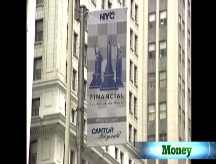A solid fund for a shaky market
Veteran fund manager Chris Davis isn't one to panic. He explains why you shouldn't either.

(Money Magazine) -- During times of market turmoil, it helps to get perspective from a truly savvy Wall Street veteran - someone like Chris Davis, lead manager of $11.3 billion Selected American Shares, a Money 70 fund.
Davis follows a long tradition of investing success. His grandfather, Shelby Cullom Davis, built a fortune in insurance stocks, and his dad, Shelby Davis, who founded the Davis Selected fund group, had one of the best fund track records in the business.
Chris Davis himself is no slouch - Selected American, which he co-manages with Ken Feinberg, has outpaced nearly 90% of large-cap stock funds over 10 years, employing a buy-and-hold strategy that many competitors can't muster the conviction to follow.
Davis doesn't speak to the press much, but when I sat down with him recently to talk about navigating today's uncertain markets, he had plenty of smart things to say that apply whether you're managing billions or thousands. His key points:
No matter how much expertise you have, you will be caught by surprise. Take financial stocks. Despite his long history with them, Davis did not fully anticipate the widespread losses by financials as a result of the subprime mess.
True, the fund had trimmed back its financial stake to about 30% of assets last year from a high of 50% three years earlier. And as a group, his stocks fell only 6.1% vs. an 18.6% loss for the overall industry, thanks to stakes in relatively stable companies such as Berkshire Hathaway (BRK.A). Nonetheless, the fund did end up holding some disasters - notably Citigroup (C, Fortune 500), down 44% in 2007.
"Citigroup is one of our worst mistakes," Davis says. At financial companies that take on leverage, he says, maintaining the right corporate culture is essential to controlling risk. But, Davis says, he and Feinberg overlooked signs of trouble at Citi, including the exit of top executives and a change in the chief financial officer position.
To be fair, Davis and Feinberg had started reducing their stake in Citi in 2006 - recently the stock accounted for just 1% of the portfolio.
"My grandfather always said, 'You make most of your money during a bear market; you just don't realize it at the time,'" Davis recalls. After all, it's when times are bad that you can scoop up quality stocks at discount prices.
But buying into a falling market requires steely nerves - and plenty of patience. In December, Davis paid $48 a share for a 4% stake in Merrill Lynch (MER, Fortune 500), which has suffered steep subprime losses. "I'm always looking for a trifecta - the right business with the right management at the right price," says Davis. "I've been studying Merrill Lynch for 15 years, and it never fit all three criteria till now."
Davis believes that the value of Merrill's wealth-management business, including its vast network of advisers, outweighs its current problems. He is a big fan of new CEO John Thain, who turned around the New York Stock Exchange (NYX). And the stock trades for half what it did a year ago.
Still, Davis is not counting on a quick rebound in either Merrill or other financial stocks. "This is not the time to back up the truck in financials," he says. "It's important to be careful about what you buy, since it's a dangerous time. Things may go lower from here."
Recently, in fact, Merrill shares were trading at just $44 a share. But Davis maintains that price declines in the stock will only create an opportunity to buy more.
Although Davis and Feinberg are constantly on the hunt for new opportunities, they rarely pull the trigger, either to buy or sell. Stocks typically remain in the fund's portfolio for eight years or more, even during times when returns lag, as long as the managers continue to have faith in the company's strategy.
"You have to give your investments time to work, and you have to expect years of underperformance," says Davis. "For the average investor, the keys to wealth are stay disciplined, keep averaging in and not try to time the market."
That's exactly what Davis is doing with the bulk of the fund's longtime holdings - blue-chip stocks that offer steady growth. Many of those companies, such as Procter & Gamble (PG, Fortune 500) and General Electric (GE, Fortune 500), earn 45% or more of their earnings abroad, which provides overseas exposure as well.
These stocks have been largely overlooked in recent years, Davis notes, as investors have chased higher returns from other asset classes, such as hedge funds and emerging markets. But those investments often carry high costs and high risk - and lately their returns have slumped. As a result, investors may finally start paying attention to the steady returns of blue chips.
Says Davis: "I think the story of the next five years will be the comeback of U.S. multinational stocks." Given the investing time horizon of the Davis funds, that wouldn't be a long wait. ![]()



